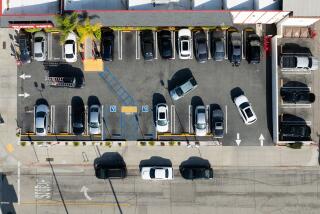A SPECIAL REPORT ON TRANSPORTATION : Carrot-and-Stick Approach Advised to Spur Car Pools
- Share via
One suggestion for motivating people to form car pools is to deny them free parking while raising their salaries by the amount the parking costs.
This idea was explored by professors Donald C. Shoup of UCLA and Don H. Pickrell of Harvard University in a 1982 paper entitled “Cashing Out Free Parking.” It theorized that employees would have a financial incentive to share rides and pocket their savings.
“If employers paid higher salaries rather than paying for parking, many commuters would do in self-interest what they have long been urged to do in the public interest--ride the bus, car-pool, bicycle or walk to work,” Shoup said.
To support that theory, Shoup cited Commuter Computer of Los Angeles, a ride-sharing information bank that used to give free employee parking.
“They subsidized bus passes and van pools, but still not many of their employees car-pooled,” he said.
Only 17% of Commuter Computer employees car-pooled when parking was free. Commuter Computer was paying $57.50 a month to rent each parking space. But in 1983, the Los Angeles-based company quit providing free parking. Instead, it paid each employee $57.50 more a month.
The percentage of car-pooling increased from 17% to 58%, Shoup said. Those riding alone to work declined from 42% to 8%.
Shoup’s conclusion: “Free parking at work may seem harmless, or even beneficial--but it indirectly pollutes the air, congests traffic and wastes energy by inviting commuters to drive to work alone. Free parking . . . encourages people to drive.”
More to Read
Sign up for Essential California
The most important California stories and recommendations in your inbox every morning.
You may occasionally receive promotional content from the Los Angeles Times.













